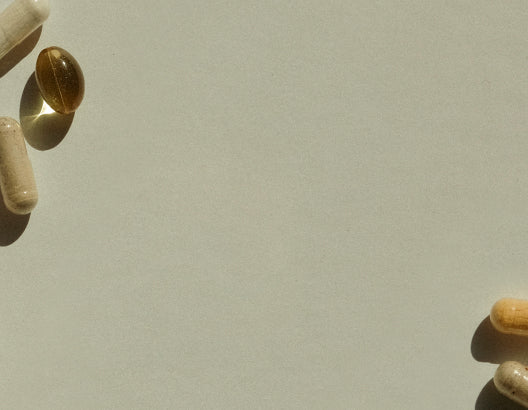We nursed on the idyllic beaches of Malibu, sandy and serene; we nursed on the hot asphalt parking lot of Trader Joe’s, sweaty and angry; I pumped on the 405 freeway, on the couch, in the bed. It was tender bonding, it was never-ending physical exertion, and after eight-and-a-half months (don’t short me those last two weeks, thank you very much) and several spine-shivering experiences with four razor-sharp baby teeth, our breastfeeding journey came to an end. Making the decision to stop breastfeeding was hard enough—there’s the mom guilt; the unfulfilled expectations; the frustrated baby—but what I did not expect was that the process would send me into a hormonal tailspin flooded with tears, anxiety, fatigue and inexplicably greasy hair.
Weaning is a major postpartum hormone shift. If you’re in this stage, explore our Postpartum Vitamins & Supplements designed to support recovery, mood, and energy.
I probed my peers to find out: Does weaning from breastfeeding make one crazy? Is something wrong with me? The anecdotes flooded in. “When I was weaning it was the worst anxiety I’ve ever had.” “I felt horrible.” “I cried all day.” I marinated: Were we all suffering through rock-hard chests and cabbage leaves in silence? What was chemically happening here?
To better make sense of the hormonal changes that happen with weaning, I spoke with Stephanie Cortner, founder of Root and Branch and licensed Acupuncturist, herbalist and Functional Medicine practitioner.
Keep reading for her tips on how to wean from breastfeeding—and support your physical and mental health in the process.

How does weaning from breastfeeding affect your hormones?
“There are hormonal changes during pregnancy and postpartum, but what a lot of women don’t expect is the huge hormonal shift throughout the process of weaning,” says Cortner.
We can actually trace that hormonal shift back to pregnancy, when our breastfeeding hormones spring into action. Prolactin is the hormone that tells the body to produce breastmilk and keeps mom feeling calm and relaxed. Prolactin production kicks off early in the first trimester, and levels continue to rise all the way through delivery, remaining at their peak for the first 6 weeks postpartum. Prolactin also produces the hormone oxytocin, which is often nicknamed “the love hormone” or “baby bonding hormone.” “Oxytocin is the reason why we feel so content and happy when we are breastfeeding,” Cortner explains.
“As we start to wean,” she says, “Prolactin levels drop, which stops the production of oxytocin as well,” Cortner explains. “From an Eastern Medicine point of view, postpartum and breastfeeding women are extremely blood deficient or as we say, liver blood and yin deficient, due to losing fluid while breastfeeding and blood during childbirth.” In other words, our bodies are already depleted after going through so much—and on top of that, swift hormonal changes can make us feel even more out of whack.
Let us personalize your vitamin
routine in 60 seconds.

What are your
stage-specific needs?
What symptoms can I expect from this change in my hormones?
“With prolactin and oxytocin levels lowering, progesterone and estrogen levels will begin to rise, which in turn sparks ovulation and our menstrual cycle to start up once again,” says Cortner. “We are not only managing the decrease in all the ‘feel good’ hormones but we are also dealing with the hormonal shifts that come with our menstrual cycles. If you had a difficult time with hormonal fluctuations before pregnancy, this might be a rather challenging time for you.”
Symptoms of Weaning from Breastfeeding
- sadness
- anxiety
- breast engorgement
- weight gain
- difficulty with concentration or "mom brain"
- dry mouth
- guilt
The bottom line: “Please know that you are not alone,” says Cortner. “The majority of symptoms should only last for a month or two and should fully subside after three months. If these manifestations go beyond that or feel unmanageable during the weaning, please reach out to your therapist or OB/GYN for further help.”
What can mothers do to support themselves proactively during this transition?
Above all else, remember to take it slow to help ease your body (and your baby) through the weaning process.
Looking for a postnatal vitamin to support you postpartum? We recommend our Mom Multi Support Pack specifically formulated by a team of OB/GYNs to support moms while breastfeeding.
$49.95
$32.95
$46.95
Shop the Article:

Mom Multi Support Pack
/ Month
Shop Now

Sleep Support*
/ Month
Shop Now

Cellular Hydration Powder
/ Month
Shop Now
Ways to Support Your Body While Weaning Off Breastfeeding
- Wean slowly by dropping one feeding a week. “If possible, this will help make symptoms less intense,” says Cortner. “This, of course, will also depend on your hormones and how your body responds to the weaning.”
- Release oxytocin by cuddling with your baby. “Even though your little one is spending less time on your breast, you can still take the same amount of time for cuddles, which will continue the release of oxytocin,” Cortner suggests.
- Try to get adequate sleep. (We know—easier said than done with a new baby at home, but try your best!)
- Eat a fiber-rich diet to support your microbiome. Gut health is so intertwined with your mood, energy levels, and other aspects of your wellbeing. A healthy diet is a great start—and you might choose to up the ante with a probiotic. Cortner also recommends foods like seaweed, black beans, fish, and black sesame seeds, which offer an array of key nutrients like iodine, magnesium, zinc, protein, and fiber.
- Round out a healthy diet with stage-specific multivitamins. Believe it or not, postpartum can be even more demanding on the body than pregnancy—especially if you’ve been breastfeeding. That’s why a regular women’s multivitamin or even your prenatal might not be enough support—and thats exactly what we had in mind while formulating our Mom Multi Support Pack. Each daily pack contains a Mom Multivitamin with essential nutrients to support through postpartum and beyond, along with an omega-3, our adaptogenic Stress Support Blend, and our Beauty Blend to support skin, hair, and nails.
- Find small ways to support your nervous system. During this chapter of motherhood, it’s finding little moments for yourself wherever you can—a 15-minute walk, a 5-minute breathing exercise. Even just a few minutes of a relaxing habit can regulate cortisol levels—and it’s so crucial to support yourself first, so you can support others.
- Stay hydrated. Even as you wean, feeding depletes fluid and mineral levels in your body. Opt for a hydration powder with electrolytes, like our Cellular Hydration Powder—it was formulated by doctors with postpartum moms in min.
How long after weaning will it take for hormones to balance and your cycle to recalibrate?
“Any changes to our body’s systems typically takes up to three months,” says Cortner. “This is the time for our hypothalamic-pituitary-ovarian (HPO) axis, which is the communication from brain to ovaries, to recalibrate.”
So, patience is key—although there are a few habits and practices that might help restore balance. “Acupuncture can greatly decrease the amount of time it takes for your body to adjust, can help with the transition in hormones, and help your body create endorphins naturally,” she says. If you still don’t feel like yourself after a few months, functional medicine lab tests are great at finding where the root of the imbalance lies so we can supplement your body with the right precursors and cofactors instead of simply chasing symptoms.”
Are anxiety and depression normal during this process?
“Unfortunately, anxiety and depression can definitely be a part of the weaning process,” syas Cortner. "Identifying where the feelings are coming from is important. There is a lot of guilt that comes up when weaning, and there are therapists that are specifically trained in postpartum and post-weaning blues. If it is purely hormonal, again, herbal formulas are really powerful. Sometimes we need a little extra help, and that is where the functional labs come in handy—it helps us see if specific neurotransmitters such as dopamine and serotonin levels are low, and allow us to give precursors to these neurotransmitters so we are telling our brains how to properly operate and fire again.”
Other times, it can be as simple as adjusting your supplement routine: “B vitamins are really important!” says Cortner. “These guys are cofactors in so many different systems in the body and when we are deficient in them, those systems, such as our mitochondria, or energy creators in our cells, don’t have the fuel they need to be powered correctly. The good news is that there are many supportive measures to ease the weaning transition— the most important thing is to be kind to yourself, listen to what your body is telling you, and ask for help.”
Wondering how to introduce solid foods? Check out our step-by-step guide—and get more tips on supporting milk supply, bottle-feeding, and other aspects of the feeding journey here.
Sign up to receive doctor-backed, stage-specific content in your inbox each week.
theFolio in Your Inbox
This article is for informational purposes only. It is not, nor is it intended to be, a substitute for professional medical advice, diagnosis, or treatment and we recommend that you always consult with your healthcare provider. To the extent that this article features the advice of physicians or medical practitioners, the views expressed are the views of the cited expert and do not necessarily represent the views of Perelel.
Written by Jessica Lopez. Jessica Lopez is a freelance writer, digital content creator, and new mother. She has covered all lifestyle topics ranging from bridal to beauty for publications including Brides Magazine, Byrdie, THE/THIRTY, and more. Walking wide-eyed into motherhood has inspired her to connect with other parents through her writing and shared experience. You can follow more of her journey @Jessica.H.Lopez.


















